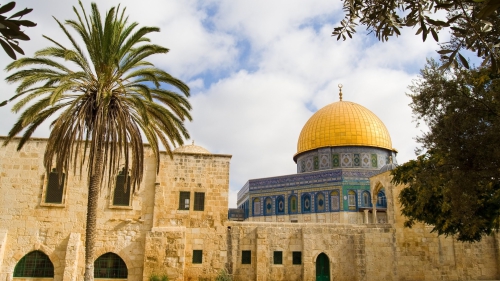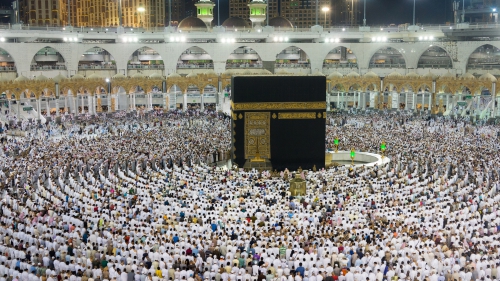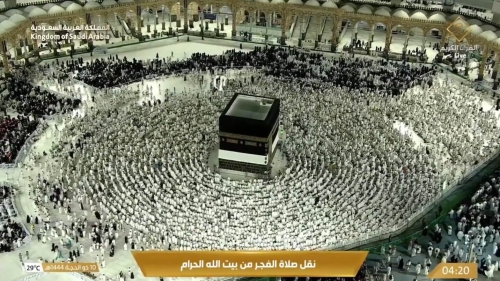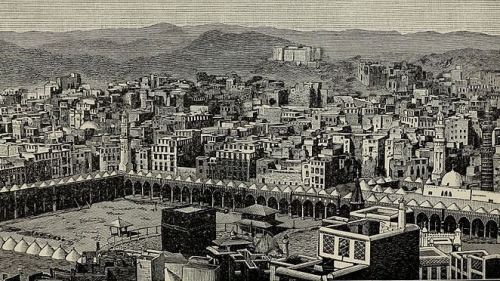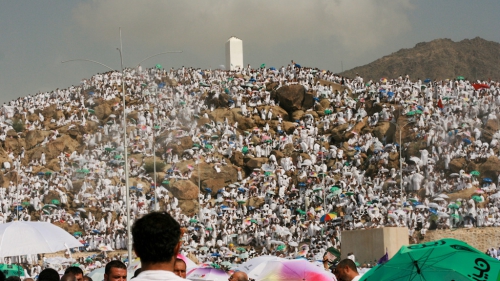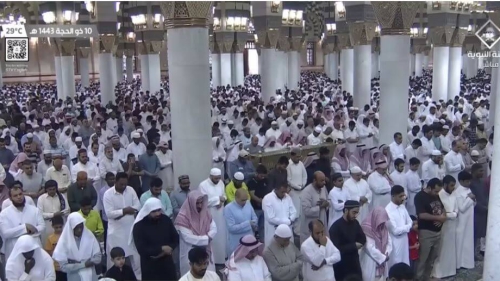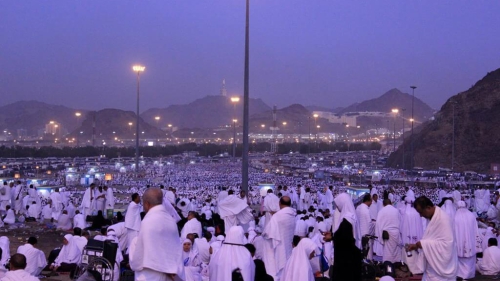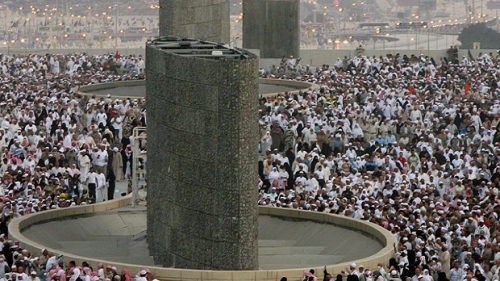Hajj: The Sacrifice of Ismail

After you have shot the last idol, offer the sacrifice immediately since these three idols are the statues of trinity and the symbols of three, satanic stages. Always be conscious of your intention and do not forget its meaning!
Know what you are doing and why? The rituals should not mislead you to overlook your purpose. All these are "hints", so be careful to view what you are supposed to see. Procedures and techniques should not confuse you, the meanings should be understood and not the formalities.
During Hajj every action depends on and is preceded by your intention. Any action without it is not accepted. Intention is obligatory for fasting too; if you forget to say it, you will somehow feel it. The same is true during jihad (holy struggle) if you do not declare the intention you are still a fighting soldier at Hajj, your acts are useless without the intention since these ceremonies are "hints", "signs" and "symbols". A person only physically touches his forehead on the ground if he does not understand the meaning of prostration. He who does not realize the essence of Hajj only brings back from Mecca a suitcase full of souvenirs and an empty mind.
During Hajj you are to:
- Declare monotheism by Tawaf.
- Exercise the struggle of Hajar by Sa'i.
- Show the descent of Adam by going to Arafat from the Kaaba.
- Show the philosophy of man's creation, the evolution of thoughts from pure science to pure love and the ascension of the spirit from mud to God by going from Arafat to Mina.
The last stage of evolution and idealism, absolute freedom with- absolute submission ... or the stage of Ibrahim (pubh) is in Mina. Now, you are about to act as Ibrahim. He brought his son Ismail to sacrifice. Who is your Ismail or what is it? Your position? Your honor? Profession? Money? House? Farm? Car? Love? Family? Knowledge? Social class? Art? Dress? Name? Your life? Your youth? Your beauty? How do I know? But you know it yourself whoever and whatever, you should have brought with you to sacrifice here. I cannot tell you which one, but I can give you some clues to help - whatever weakens your faith, whatever stops you from "going", whatever distracts you from accepting responsibilities, whatever causes you to be self-centered, whatever makes you unable to hear the message and confess the truth whatever forces you to "escape", whatever causes you to rationalize for the sake of convenience, whatever makes you blind and deaf ... You are in the position of Ibrahim whose weakness was in his love for Ismail (his son). He was teased by Satan. Imagine yourself at the peak of honor, full of pride and there is only ONE THING for which you can give up everything and sacrifice any other love for its love. THAT IS YOUR ISMAIL! Your Ismail can be a person, an object, a rank, a position or even a "weakness"! But - for Ibrahim it was his son!
Toward the end of his life, Ibrahim witnessed a century of struggle, movement, homelessness, confrontation with the ignorance of his tribe, oppression of Nimrod and the fanaticism of idol worshippers. While intelligent and rebellious, he spent his youth in the house of a fanatic idol-worshipper and idol-maker (Azar). His barren wife Sara was an aristocrat.
Ibrahim undertook the difficult task of being a prophet of monotheism within an oppressive system. In that age of darkness, he tolerated a century of torture and created an awareness and love for freedom in a people who were so used to oppression.
Ibrahim got old and lonely. At the height of his prophecy he remained a "man", yet, as any other human being, he wished to have a son. His wife was infertile and he was more than a hundred years old. He was wishful, but not hopeful. Allah rewarded the old man for the time he spent and the suffering he experienced while propagating "His message". He blessed him with a son (Ismail) from his maid, Hajar. She was a black woman who was not "honorable" enough to create jealousy in the heart of his first wife, Sara.
Ismail was not only a son for his father. He was the result of a whole life's expectation, the reward for a life full of struggle. The only son of an old father, he was the most dear after all those years. For Ibrahim, Ismail was his son, but your Ismail may be "you", your family, your job, your wealth, your fame...How do I know? For Ibrahim, it was his son; such a son for such a father.
In front of his eyes - eyes that were shaded by white eyebrows and glittered with happiness - Ismail grew and received the best care and love from his father whose soul was so firmly devoted to the life of his son. His father saw him as an only sibling growing in the barren desert life of an old farmer.
"Every moment of the last days of his life had to be enjoyed". He enjoyed it by having Ismail! Ismail differed from an ordinary child:
- Because his father yearned for him for a hundred years!
- Because he was unexpectedly born to the surprise of his father!
Ismail, the boy, grew as a strong tree. He brought youth and happiness to Ibrahim's life. He was his father's hope, love and kin
The message was revealed - "Ibrahim put the knife to the throat of your son and sacrifice him with your hands!" How can one describe Ibrahim's fear by the shock of this message? Even if we were there as witnesses, we couldn't feel it. The degree of his pain is beyond tolerance or imagination! Ibrahim, the most humble servant of God and the famous rebel of human history, started to shake as if he were falling apart and the great invincible of history was breaking to pieces. He was terribly shocked by the message, but the command was the order of Allah.
War, the great war, was fighting one's self. The victorious hero of the greatest war in history was broken, weak fearful, amazed and hopeless! Ibrahim was confronted with an internal conflict to choose between Allah and Ismail. What a difficult decision to make? Which one would you choose? Allah or yourself? Interest or value? Dependence or freedom? Policy or fact? To stop or to go? Happiness or perfection? To enjoy or to tolerate the pain of responsibility? To live just to live or to live for your goal? Peace and love or belief and struggle? To follow your nature or your conscious will? To serve your feeling or to serve your faith? To be a father or the prophet? To care for relatives or to carry the message. And ...? Finally Allah or your Ismail? Ibrahim, choose one!
After a hundred years of prophecy among the people, a life of leadership struggling with idol worshippers, ignorant and oppressors, being victorious on all fronts and successful in delivering your responsibilities, nowhere and never having any doubts in your way, disregarding any personal interest, getting as close to God as is possible for a man, establishing the nation of tawheed passing all the exams and ... Do not feel impetuous, do not rest, do not think you are hero, irresistible and having no weakness. Victories of those hundred years should not mislead you or deceive you; do not think you are "innocent". Do not feel so secure and protected from satanic temptations. You are not always immune from those invisible powers that surround mankind. There are so many beams of artificial glories that may make you blind. He (Allah) knows you better than yourself. He knows you are still vulnerable. He knows there is still a point from where you can see the world and worldly matters. Then He severs any narrow contact you may have with this world!
Oh Ibrahim, the victorious hero of the greatest battle of history, with your high spirit and irresistibility! Oh prominent prophet of God!
- Do not think we are finished with you. The distance between man and God is not very far
God is closer to you than your jugular vein. Quran 50:16
But the distance is as far as "eternity". Don't take it too easy!
As a prophet, you reached the climax of perfection, but in "obedience", you are not yet "perfect". Oh friend of Allah, founder of monotheism, constructor of the road of Moses, Jesus and Muhammad (S)! Oh symbol of Man's glory, dignity and perfection! - You are Ibrahim, but to be "obedient" is much more difficult. You have to be "absolutely free". Do not be so confident and proud of yourself since there is always the possibility of "falling" at any "peak". The fall of those at the highest peak is most disastrous and tragic!
The Sacrifice of Ismail
Your dear son, the fruit of your life, your joy, your reason for being, the meaning of your existence, your son, no, your Ismail - Knock him down as a lamb and offer him as a sacrifice! Hold his limbs under your feet so he cannot escape. Hold his head by grabbing his hair in your hands, cut his carotid, but hold him under your feet until you feel he cannot move anymore. Then - stand up and leave him alone! Oh "obedient" one and "Servant" of God! This is what God wants from you. This is the "call of your faith" "the spirit of your message". This is your responsibility - Oh "responsible man"! Oh "father of Ismail"!
Ibrahim had two alternatives - either to follow the cry of his heart and "save" Ismail or to follow the order of God and "sacrifice" him! He had to choose one! "Love" and "truth" were struggling inside him (love which was his life and truth which was his faith)! Had Allah asked for his own life, it would have been much easier! Ibrahim gave his life for the cause of Allah and this was why he felt "obedient" to God. This was”selfishness" and a "weakness" for him. What is good and beautiful for certain people is considered bad and ugly for an honorable man like Ibrahim. He was the closest to God. (Note the relativity of moral values in Ibrahim's school! What a different interpretation.)
Oh Ibrahim, "give up your Ismail"! "Doubt" - how killing and dangerous it is! As a result, one seeks refuge in an "explanation and justification". This happens when the heart hates but the faith loves! His "responsibility" wants him to give up his son, but it is very difficult to do. He tries to find a means of evasion. What is worse than a wrong "interpretation" is the right "explanation" (i.e. to rely on one "fact" and to deny another "fact")! And more disastrous is when "falsehood" has "wisdom" as a sword in one hand and "religion" as a shield in the other!
"SACRIFICE YOUR ISMAIL" - How do I know the meaning of this command? How can I be sure that the word "sacrifice" does not have a figurative meaning like "sacrifice your soul" which means do not be the slave of your instincts and avoid their temptation! How do I know that the pronoun "you" in "your Ismail" is referring to me and I am the receiver of this call? Why is not this a collective call which in figurative meaning is an individual call? How do I know "Ismail" refers to "my Ismail" and it is not again a figurative word?'
How do I know that from a grammatical point of view, in the phrase "sacrificing Ismail", Ismail is not a noun in the genitive case which replaces the noun governing the genitive and the latter omitted? This very often happens in the Arabic language as well as in the Holy Qur’an. For example, "asked the village" means "asked the people of the village" and here to "sacrifice Ismail" means to "sacrifice for the love of Ismail".
Let us suppose all these possibilities are impossible; none of the given meanings are correct and the command is as simple as everyone understands it. "Sacrifice your Ismail" - how do I know this has to be done right away? There is no time limit in this order as any written law. It is the duty of wisdom to choose the time taking into consideration the circumstances, policies, possibilities and potentials. The Holy Qur’an says to participate in Holy War but the time and form of this war depends on circumstances adopted by wisdom. Another example is the tradition where one is ordered to search for knowledge.
"Searching for knowledge is a must for every Muslim man and woman."
No one is forced to do it at a given time; even if he does it at the very last hours of his life when he is in bed dying he has obeyed the command and performed his duty! Another example is the Hajj which is the duty of every Muslim. Many wait until they have lived their life freely; towards the end of it, they may decide to perform Hajj. This is a duty which can be fulfilled at anytime. These believers think it is a responsibility they have towards the hereafter, not towards life. They feel most religious laws are for the blessing and forgiveness in the after-life, not for the benefit of their education progress and perfection in the life before death.'
How do I know, from a methodical point of view, that this imperative sentence "sacrifice your Ismail" is a "must" and not a recommendation? Most likely it is the latter one! This is not like the order of "and give the poor due “where everyone should give the needy his share.
Rather it is like this verse:
And eat not up your property among yourselves in vanity nor seek by it to Sain the hearing of the judges that ye may knowingly devour a portion of the property of others wrongfully. Quran 2:188
It is a despicable action in the eyes of God. The order in this verse is for our guidance. This type of order, the order of revelation, is to remind us of the judgment of our wisdom.
If we disregard all the explanations and interpretations stated above, it is obvious from His command that the Almighty God wants to remind us that the love for a child is nothing. To submit to the truth, you must give up all interests which pre-occupy your thoughts and prevent you from communicating with God. Since Ibrahim's love for Ismail kept Him busy and may have caused him to forget his responsibility, Allah ordered him to "Sacrifice Ismail" so that he would submit totally to the will of Allah. As was said earlier, to SACRIFICE YOUR ISMAIL means to disregard the joy and love of Ismail. The same essence may be derived from the following verse:
And know that your possessions and your children are a test. Quran 8:28
After all these wise and legitimate explanations, examples of verses, stories, measures of methodical science and rationalizations for all purposes of good, it is a sin to kill someone!!! One cannot attribute such a sinful command to the most merciful and exalted Allah!
Yes an "explanation “to find an "escape" is used when it is hard to accept the fact; and to accept the responsibility is contrary to one's wishes and dreams. When "fact" and "justice" are only "by-standers of life", many men will speak of "justice" and "human rights". They may justify themselves by doing "some good deeds" along with their daily routines, continuing their business and living their happy life without disturbances! When "fact" and "justice" are "concurrent with life", they are used as a capital, a tool, a fame, a rank, a job and a license for living. People not only speak of justice, but consider themselves righteous and wish to serve others.
But when "truth clashes with one's daily life", then the supporter of the truth and justice is going to be in trouble and in danger ... He has to shoulder a very heavy responsibility, find his way through the dark and stormy night and face all the hazards and pitfalls. The farther he goes in this way, the fewer his companions become until he is left with a few friends or none at all! He has to leave behind whatever and whoever is an obstacle in his way, especially those who live in the darkness of oppression and are used to it.
Almighty Allah is ordering you to sacrifice your life and your love and to go on; but evil temptations force you to stay and follow them how? - By the explanations! That is, by making alterations in your faith in order to cope with worldly demands. As such you will not be accused of being an unbeliever or rebellious against God and disloyal to people! Here "explanation" means "to certify the false as truth". You may call it whatever you want - a social, moral, scientific, psychological, dialectical or intellectual explanation. What difference does it make? But in Hajj and in the biography of Ibrahim the great who was victorious in all his trials honest, righteous, sincere and struggled in Jihad to defend the "absolute truth", Allah called it - "the evil explanation"! Ibrahim’s clear and strong wisdom was weakened by these questions - How do I know? How can it be? I only heard this message in my "dream", he said. Satan strengthened the "love for his son" in his heart and made him rationalize a means of "escape"! This was the first time, the first Jamarah and he refused to sacrifice his son!
Ibrahim "you must sacrifice your son"! The message was clearer. This created struggle inside the great hero of human history. Because of Satan's temptation, he felt doubt, fear and weakness. He was defeated in the conflict between Allah and Satan. In the depth of human nature there exists a contradiction between love and wisdom, life and faith for one's self or for God
This is the nature of man - a phenomenon between human and animal, nature and God, instinct and wisdom, heaven and earth, this world and the hereafter, love for one's self and love for God, reality and truth satisfaction and perfection, being and becoming, slavery and freedom, carelessness and responsibility, belief and disbelief, for "me" and for "us" and finally the one "who is" and one "who should.
It was the second day. Ibrahim weighed his love for Ismail against his responsibility to Allah. Ismail's life was in danger. Satan attempted to deceive Ibrahim just as he persuaded "Adam to eat from the "forbidden fruit" in the Garden! As any man with dialectic potentials - mud and the spirit of God - Ibrahim was in doubt whether he should choose his "son" or the "message".
And inspired it (with consciousness) what is wrong for it and right for it. Quran 91:8
- Oh Prophet of God, the message is your responsibility!
- Oh Prophet of God, do you want to remain a father to your son?
- Do I have to sacrifice Ismail with my own hands?
- Yes! I must sacrifice my son for the cause of Allah.
- Emotional obligations are the least important when compared to my ideology.
- Shall I remain the father of Ismail or carry on the message?
Satan tried again: "But I hear this message in my dream; how could it be real?" And this was the second time he refused to sacrifice his son Ibrahim, SACRIFICE YOUR SON ISMAIL. This time the message was so clear that it was difficult to rationalize by any type of "explanation". He had no choice; the call was as plain as black and white. Satan, with all his intelligence and skill, could not do anything to change it. Denying the message would be obeying Satan. He was at the edge of a very deep valley; should he fall off. Should Ibrahim, who destroyed the idols, was a great prophet founded Islam, led the Umma (nation) ..., fall from the glorious height of tawheed to the depth of the valley of disbelief ... Not disbelief, but belief in many gods and worshipping others along with God!
The Quran describes Ibrahim standing in Mina, facing Allah and Satan. He cannot side with both and he cannot ignore them. What a fearful story - "man" the representative of God who can act similar to God to do almost anything he wants and rule the whole world here is so weak and disabled! He has the spirit of God, yet he has weakness.
For man was created weak. Quran 4:28
In this world, no one is safe from falling. Like a child who has just learned to walk, you must be careful not to fall! Had not the last prophet of God been careful, he would have fallen and he would no longer have been innocent.
If thou ascribe a partner to Allah thy work will fail and thou indeed wilt be among the losers. Quran 39:65
At the end of his life, Ibrahim, the father of the great prophets of Islam, the most exalted by human spirit and God's love, was led to the edge of this pitfall because of "his natural love for Ismail". After being a righteous and true believer for a hundred years, Ibrahim was about to be cheated by Satan.
Ibrahim, "there is no choice for you", Allah and Satan are at your right and left. Which one are you going to choose? Now there is no doubt about the message. The searcher of truth hardly makes a mistake just as the honeybee finds his hive in the dark, in the storm in the desert or on the distant mountain. No, Ibrahim who lived a long and trustworthy life was not going to be cheated by Satan! Accepting the message was like jumping into a fire; and Satan, the enemy, was trying to put it out. You cannot tell an enemy from a friend by what he does; this judgment should not be based on self interest.
It was obvious what Ibrahim had to do. His previous doubts stemmed from the extreme love he had for Ismail. The poor, old father desperately waited for a son for many years. It was painful, very painful! Oh, such a fearful tragedy! Ibrahim's responsibility was beyond the tolerance of an old and lonely father who had to sacrifice his son. It would have been much easier had Ibrahim been sacrificed by Ismail. Easy and joyful, but no - the young Ismail to die and the old father to survive, lonely and sad ... with his old and bloody hands!
When Ibrahim thought about the message, he was absolutely obedient, but when he thought of sacrificing Ismail, he felt an intolerable pain, breaking his bone and leaving a sad expression on his face. Satan who saw Ibrahim in such a miserable state, tried to cheat him again! Satan is the enemy of man! Wherever and whomever there is a sign of fear, weakness, doubt, jealousy, disparity, stupidity and even love, he appears to do his evil job. He entertains and keeps you from your duties so that the truth of the message will not be realized.
Even the love for your son is a way of "testing" you! Quran 8:28
The love of Ismail was a test for Ibrahim; this was his only weakness when he was confronted by Eblis (Satan). Ibrahim knew it was a clear revelation and that he had to sacrifice his son. He was sad and broken hearted. This is how Satan had the opportunity to deceive him. Taking advantage of the situation, Satan appeared before Ibrahim and whispered the same thing-"I heard this message in my dream". "No, that is enough, that is enough", Ibrahim said to himself! He made his decision and his choice was obvious - "absolute freedom of obedience to Allah" (i.e. to sacrifice Ismail). This was the last obstacle in the way of his freedom. Ibrahim decided to share the message with Ismail, so he called him. Ismail came and his father looked at him from his head to his toe. He was a victim and such a great sacrifice.
The Dialogue between Father and Son
In Mina, in a quiet corner, Ibrahim talked to his son! The father gray-haired and bearded, lived a century, while Ismail was just growing into a young man. The sky of the Arabian peninsula, no, the world, could not tolerate such a sight! History had never before recorded a similar dialogue between a father and a son. No one had ever thought of this conversation, a very friendly, but fearful one!
At first, Ibrahim was unable to open his mouth to repeat the story to his son - "I am here to sacrifice you with my hands". Finally, he put himself in God's trust and said, "Ismail, I had a dream I was slaughtering you"! He said these words quickly so he would not hear them himself. Then he remained silent. Fearful and pale, he could not bear looking into Ismail's eyes. Ismail realized what his father was going through and he tried to console him. He said, "Father be obedient and do not hesitate to fulfill the order of Almighty God. You will find that I am also obedient and with God's help can tolerate it".
Ibrahim put all his trust in God and became more fearful. He made his decision, stood up, picked the knife and tried to sharpen it with a p1ece of stone. Could he do this to the son he so loved? Ismail, the brave man who accepted Allah's will, was so relaxed and quiet, as if nothing was going to happen. Ibrahim, the true lover of Allah, first destroyed his selfish feelings and relied only on Him. Then he took the young victim to the place of sacrifice, asked him to lie on the ground, held his legs, grabbed his hair and held his head back in order to see his carotid artery.
In the name of God, he put the knife to Ismail's throat and tried to cut it as quickly as possible. The old man tried to finish in a moment. But, oh this knife! The knife would not cut! It hurts me; what a torture it is! Angrily, he threw the knife away! Ibrahim was roaring like a wounded lion. Full of fear, he asked, "Am I not his father"? Hurriedly, he picked up the knife to try again. Ismail remained quiet and calm during this time; he did not even move. Before Ibrahim touched him again, a sheep suddenly appeared with a message - "Oh Ibrahim, God does not want you to sacrifice Ismail. This sheep is sent to you as his ransom. You have carried out the order! God is great"!
A lesson was taught by the Almighty God - from now on there would be no more sacrifice of man for God ... That was a tradition and form of worshipping God! In Ibrahim's religion, sheep are sacrificed and not man! Another great lesson is that Ibrahim's God, in contrast to other gods, is not blood-thirsty; those other gods are hungry, hungry for meat! The most meaningful lesson is that God did not want Ismail to be sacrificed, but wanted Ibrahim to sacrifice Ismail and he did it bravely! Ismail was honored to have been chosen for the sacrifice and he patiently persevered. But then, there was no need to kill him. God, the Almighty, is not needy; we human beings have all kinds of needs!
This was the will of Almighty God, the most kind and most merciful to man. He honored and promoted Ibrahim to the point where he was ready to sacrifice Ismail without actually killing him. God also honored Ismail by being His sacrifice, yet he was not hurt at all!
This is Ibrahim's faith (Islam) and not the story of blood thirsty gods, masochists or human torturers. It is a story of man's perfection and his freedom from selfishness and animalistic desires. It is man's ascension to a higher spirit and love, to a strong will that frees him from anything that may hinder his responsibility as a conscious man, to make him ready to sacrifice himself as Ismail, to become a martyr and finally, something not found in the dictionary - "to be like Ibrahim"! The story ends with the sacrifice of a sheep. This is what Almighty God requested at the end of this greatest human tragedy - to sacrifice a sheep to feed a few hungry people.
Like Ibrahim, you should select and bring your Ismail to Mina who is your Ismail? You should know; there is no need for others to know! May be your wife, job, talent, sex, power, rank, position ... etc. I don't know which one it is, but it should be whatever is so dear as Ismail was to Ibrahim! Some of the signs of your Ismail are whatever takes away your freedom and stops you from performing your duties, whatever joy entertains you, whatever keeps you from hearing and knowing the truth, whatever persuades you to rationalize rather than accept responsibility and whoever supports you only to receive your support in the future. You must search and find it in your life. If you are going to approach Almighty God, you should sacrifice your Ismail in Mina.
Do not choose the sheep (ransom) yourself; let the Almighty help and present it to you as a gift. This is how he accepts the sheep as a sacrifice. To offer a sheep instead of Ismail is a "sacrifice", but to sacrifice a sheep just for the sake of sacrifice is "butchery"!
Excerpted from a section of the book "Hajj" by Dr. Ali Shariati and translated by Dr. Ali A. Behzadnia.
Topics: Hajj, Jamarat, Mina, Prophet Ibrahim (Abraham), Prophet Ismail (Ishmail), Satan (Iblis), Tawhid (Oneness Of God) Values: Guidance, Love, Sacrifice Channel: Hajj - Day 3
Views:11322
Related Suggestions









